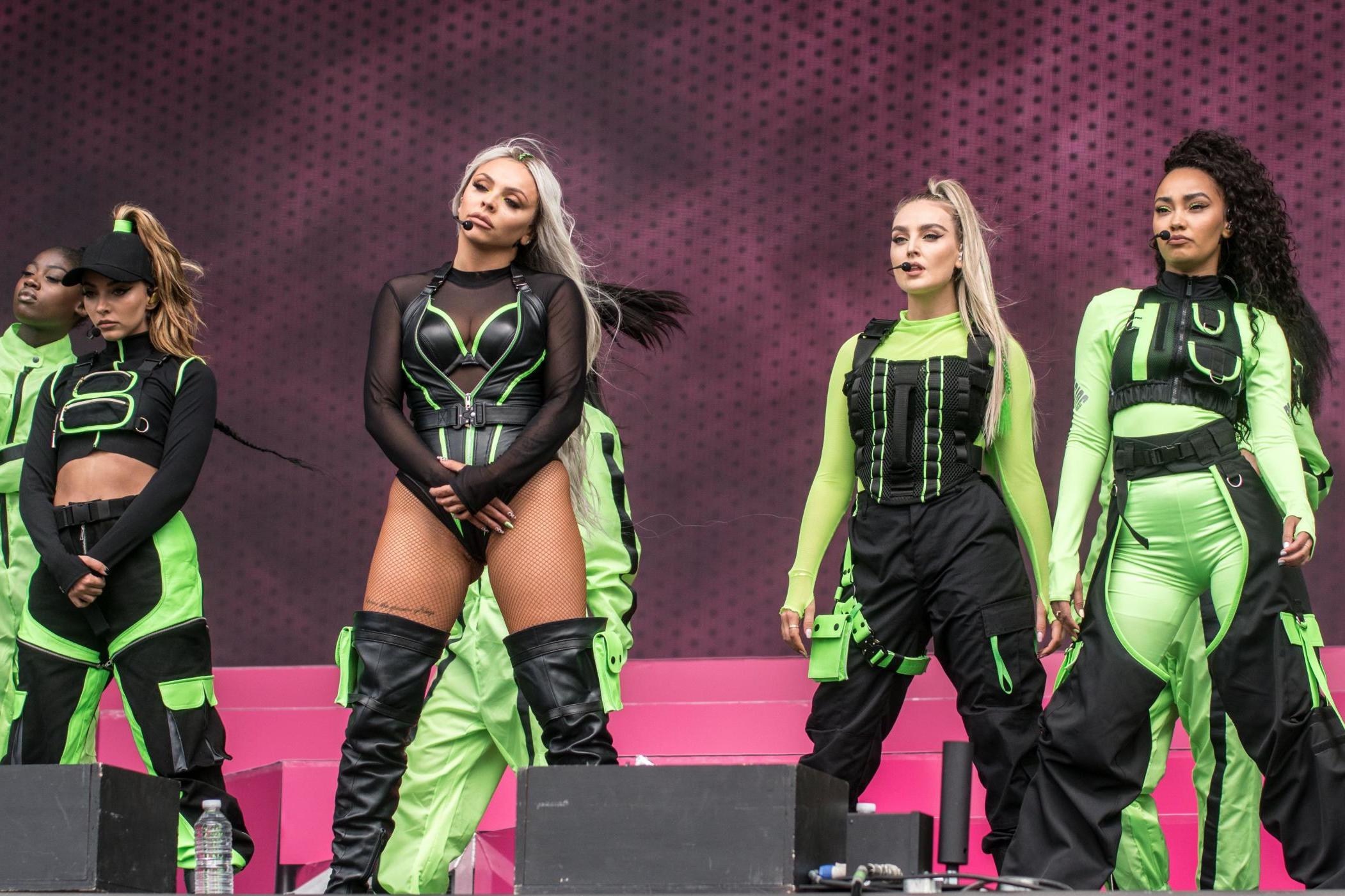Little Mix: ‘How dare they accuse us of trying to be sexual!’
Exclusive: The 50-million-selling girl group talk to Fiona Sturges about their brand new single, cracking America, the sexism of being told to flirt with men, and the dangers of ‘Love Island’


Your support helps us to tell the story
From reproductive rights to climate change to Big Tech, The Independent is on the ground when the story is developing. Whether it's investigating the financials of Elon Musk's pro-Trump PAC or producing our latest documentary, 'The A Word', which shines a light on the American women fighting for reproductive rights, we know how important it is to parse out the facts from the messaging.
At such a critical moment in US history, we need reporters on the ground. Your donation allows us to keep sending journalists to speak to both sides of the story.
The Independent is trusted by Americans across the entire political spectrum. And unlike many other quality news outlets, we choose not to lock Americans out of our reporting and analysis with paywalls. We believe quality journalism should be available to everyone, paid for by those who can afford it.
Your support makes all the difference.The past six months have been quite the ride for Little Mix, the British band who have reached 50 million in global sales and, in maintaining their original line-up since 2011, have now outlasted their girl group forebears All Saints, Spice Girls, Atomic Kitten and Sugababes. Since November last year, when they released their fifth LP, the succinctly titled LM5, the one-time X Factor winners have taken on the big beasts of music and the media, and won.
First came their split from Syco, the record label owned by Simon Cowell, allegedly owing to a dispute over writing credits (they signed to RCA shortly afterwards). Later, following the release of their ode to body positivity, “Strip”, the video of which finds them sitting naked with the insults thrown at them on social media painted on their skin, they were accused of using nudity to make money by that great defender of feminine purity, Piers Morgan. After Morgan called them “talentless, clothes-allergic dimwits”, Jesy Nelson, who hails from Essex and is known for being the mouthiest of the group, called him a “silly twat” during an interview on Radio 1.

Today, the band – which, along with Nelson, comprises Perrie Edwards, Leigh-Anne Pinnock and Jade Thirlwall – are staying shtum on the subject of Cowell and Syco. All they will say is: “It didn’t work out.” And, loath to poke the hornets’ nest, they are similarly wary of mentioning Morgan. Yet, alluding to the furore that followed the release of “Strip”, they’re clearly indignant about the way men and women pop stars are treated differently. “There we were trying to send out this amazing, inspiring message and these people are saying, ‘Look at them trying to be sexual,’” exclaims Pinnock. “How dare they! We’re there trying to help people and you’re projecting that on to us. I’ve seen countless images of boybands with practically no clothes on and they are celebrated. It’s unfair.”
We are in a small meeting room at their record label’s headquarters in London where, stylishly dressed down in jeans, jackets and heels, they are doing promo for “Bounce Back”, their new single that samples Soul II Soul’s “Back to Life” and has summer banger stamped all over it. “Everyone knows the sample and our mums love it,” says Edwards, proudly.
They are funny and friendly, each greeting me with a hug rather than a handshake. Outsiders looking to spot signs of discord will have their work cut out. Certainly, the way in which the four of them squash themselves into a two-seater sofa – and say “sorry, babe” when they interrupt one another – would suggest a united force.
They tell me that the manner in which they were brought together in 2011 – they auditioned for The X Factor individually; it was the judges’ idea that they form a band – has brought about a unique friendship. Thrust into the deep end, they quickly bonded through the weirdness of their circumstances and formed what they call their “Little Mix wall”, behind which they could share their anxieties. That they haven’t adhered to the popular girl/boyband pattern involving one of their number leaving the group and then spilling the beans on their years of misery is, they say, due not just to their bond but also the fact that they are all equal. “No one wants to outshine anyone else,” says Nelson. “And anyway, it’s scary to imagine doing this job alone,” adds Pinnock. “[As a group] we’ve got each other’s backs.”
We are going to f**k up sometimes and do silly things
In the years following their X Factor win, a lot of decision-making went on behind the scenes without their say-so. Now they are closely involved in every aspect of what they do, from songwriting to clothing to video direction. This hands-on approach has coincided with a new confidence and a louder voice about issues that matter to them, whether that’s LGBT+ rights – they recently performed “Secret Love Song” in Dubai, where homosexuality is illegal, underneath a rainbow flag – or taking on the body-shamers and the music industry misogynists. “It’s taken a few years to find our feet and find the confidence to be more vocal about things,” says Thirlwall. “[It comes from] age, maturity and knowing that we’ve got a solid fanbase. Now I feel like the world’s very aware that artists have a lot of influence, especially on younger people, so I feel we can speak more, be heard and be taken seriously.”
Pinnock recalls an early experience of sexism while visiting a radio station during a promotional trip to America. “We were told to go into this room and flirt with these men. It’s always about schmoozing and sucking up [though] this time the word was ‘flirt’. We all thought ‘urgh’, but we were, like, ‘OK, whatever.’” When you look back on it now you think, ‘I should have said something. That is gross.’ But it’s hard.”
Now aged between 25 and 28, Little Mix started their careers young; looking back, they say, it’s not surprising they were slow to speak up. Edwards, the youngest in the group, was 16 the first time she auditioned for X Factor. Rejected in an early round, she returned a year later, and had just turned 18 when she and the band reached the final. “The whole thing only became real to me after we had won and we were whisked away,” she recalls. “I had assumed we’d go home for a bit after the show, but it didn’t happen like that. People were telling us, ‘Right, this is going to be your lives from now on. This is your schedule.’ I remember I was in a room with Jade and I rang my mum and I was, like, ‘Mum, I’ve changed my mind. I don’t want to do it. I’m not ready for this.’”
Enjoy unlimited access to 100 million ad-free songs and podcasts with Amazon Music
Sign up now for a 4 month free trial (3 months for non-Prime members)
Enjoy unlimited access to 100 million ad-free songs and podcasts with Amazon Music
Sign up now for a 4 month free trial (3 months for non-Prime members)
In the end, she decided to “ride the wave” and moved to London with the rest of them. They chose a flat in Notting Hill because it was the only place they’d heard of thanks to the Hugh Grant film. After moving in, they would ring their mothers 10 times a day. “It was ‘Mum, how do we turn [the cooker] on?’” recalls Thirlwall. “Oh, we were terrible,” agrees Nelson. “We would put all our washing out on the line and then go to get it the next day and we’d be, like, ‘Oh, it’s rained. It’s all dirty again.’”
When I ask what, if anything, was offered in the way of aftercare following The X Factor final, they laugh ruefully. At the very least, they say, it would have been an idea to have some financial advice. Nonetheless, they are big fans of reality TV and can’t get enough of Love Island, despite being alert to its pitfalls. “When you’re young, it’s a lot,” says Nelson, of the difficulties facing contestants when they return to real life. “Particularly when you’re branded a villain. That’s a lot to deal with for someone who never thought of themselves as a bad person. On these shows, you have no control over how people see you.”

Little Mix are among the first British pop bands to have evolved in the glare of social media, something they see as a blessing and curse. They love being able to talk directly to fans – “it’s just like you’re texting your mates” – and are agog at the idea of the Spice Girls having to reply to fan letters one by one. Still, they worry about the effect of “Insta perfection” on young girls and would like to see the end of the “like” button. More generally, the sight of youngsters permanently on their phones makes them sad. “We were saying the other day that kids are never going to go round and knock for their mates any more,” says Nelson. “There’ll be no [adopts awkward teenage voice] ‘Errrrr, is Liam around?’ They’re not going to experience what we experienced.”
We talk for a while about the expectation that female singers should set a positive example to their young fans, and the pressure that can bring. “We want to just live our lives normally,” says Nelson. “We are going to f**k up sometimes and do silly things. People say, ‘You’re meant to be a role model’. And I’m, like, ‘Well no, I didn’t take on that role actually. You gave that to me.’” What keeps them sane, apart from each other, is their families and the friends they’ve known since childhood. “They’re the escape for us,” says Thirlwall. Even so, I tell them, the day to day of their job doesn’t sound especially fun. They can’t remember the last time they had a day off and they are permanently knackered from the late nights followed by early mornings. From time to time, their mums will join them for a few days at work. “Like, they’ll come to LA and they start out all excited,” says Edwards. “It’s all, like, ‘Oooh, we’re going to see what the girls are up to.’ Then, after day three, they’ll say: ‘I think we’re going to stay at the hotel today.’”
“Obviously we love it, but we work bloody hard,” explains Nelson. “People don’t see the amount of effort that goes into what we do. In a normal job, you’d clock off, go home, put the telly on and switch off. But you can’t un-famous yourself. You can’t go ‘Actually, I’m not working today’, and pop to Tesco to fill up on snacks.”
And yet, on they go: undaunted, indefatigable, hungry for more. The next plan, they say, is to crack America – “That’s one of the biggest dreams for us,” says Edwards. “I mean, we’re talented and we’re ambitious. We feel like our music should be huge over there.” “Totally,” agrees Thirlwall. “Definitely,” chorus Pinnock and Nelson. And off they troop to their next interview, the next step in their plan to conquer the world.
“Bounce Back” (RCA/Sony) is out now
Join our commenting forum
Join thought-provoking conversations, follow other Independent readers and see their replies
Comments